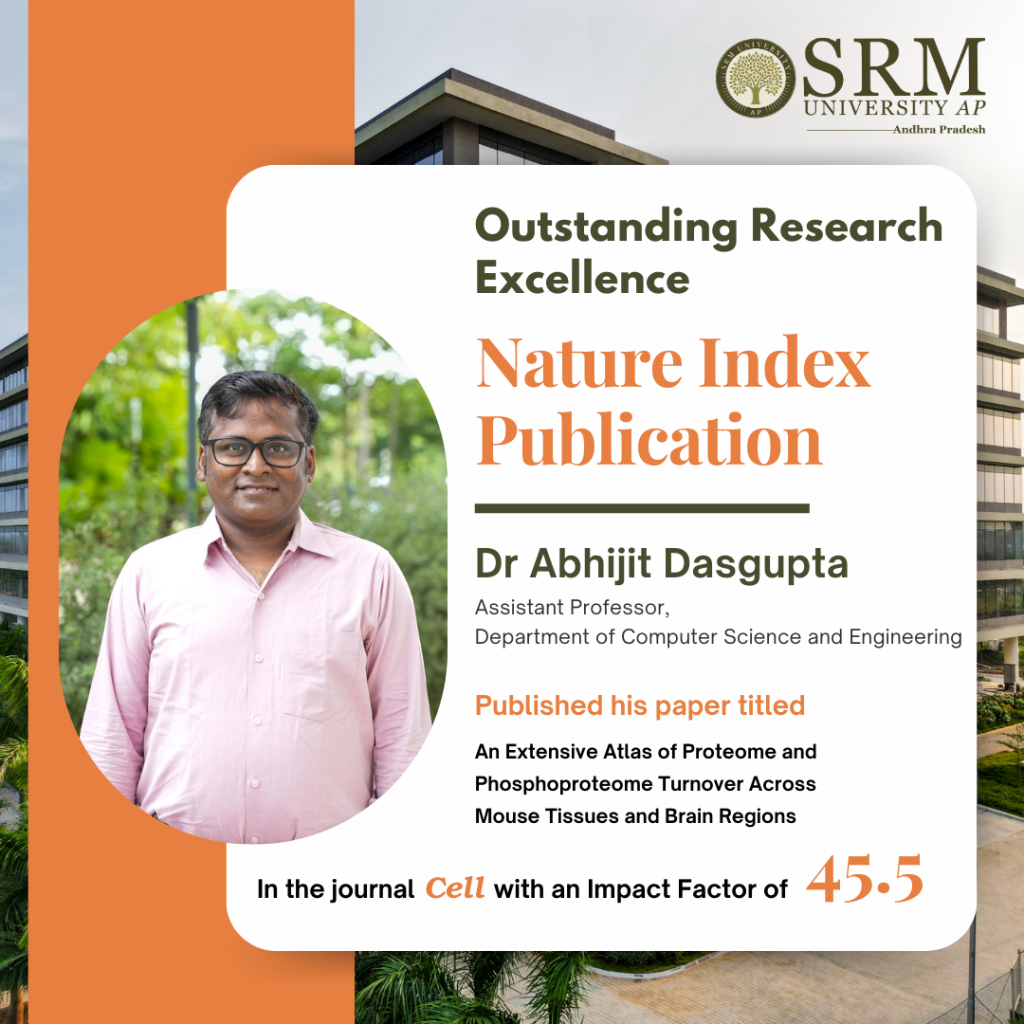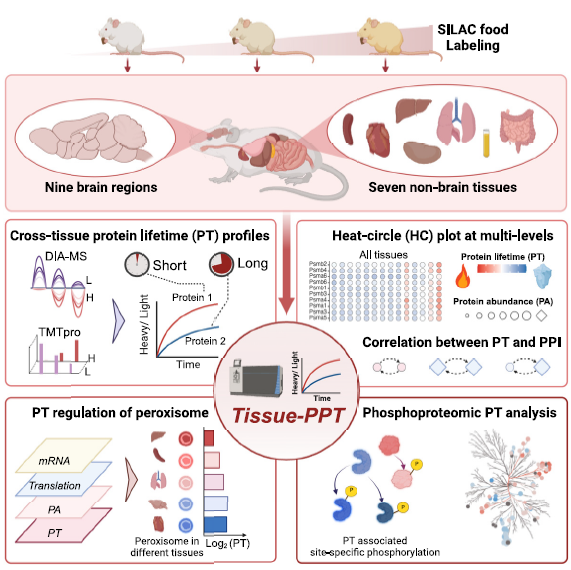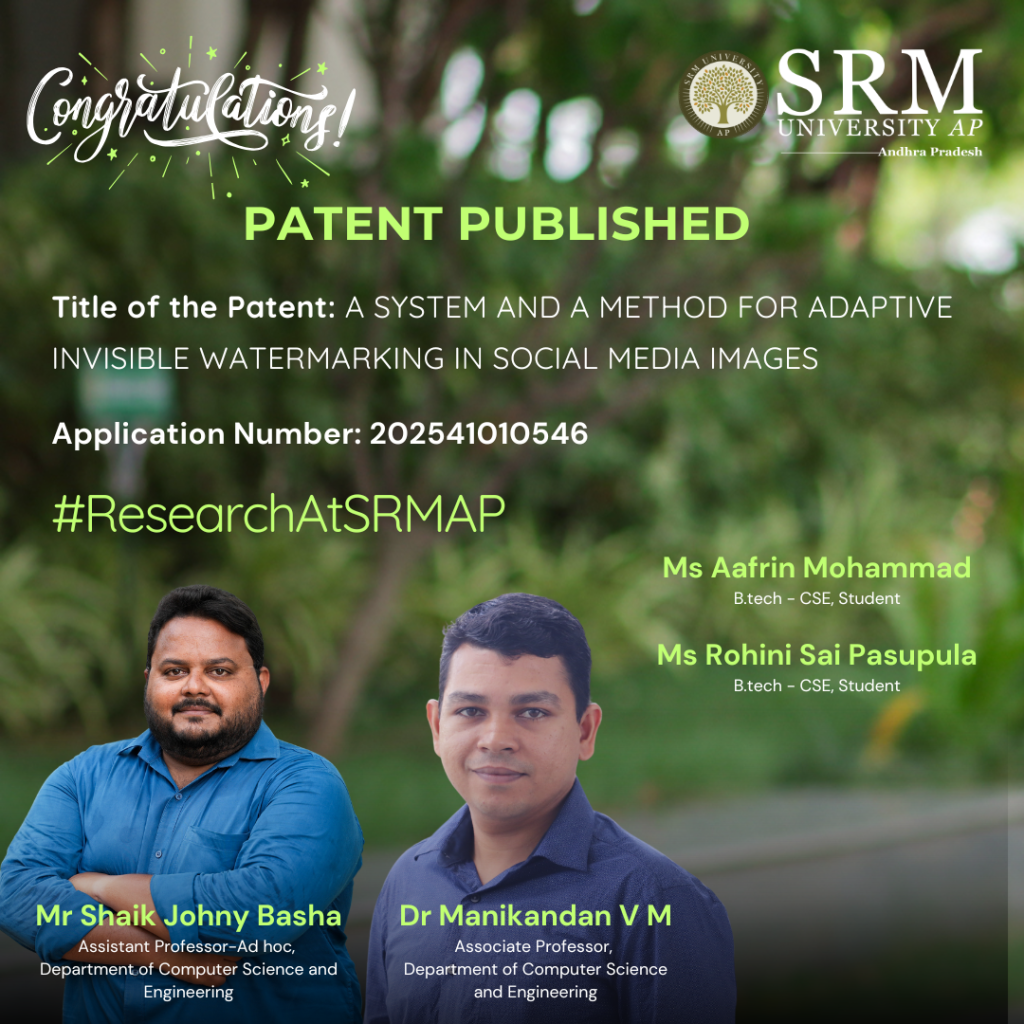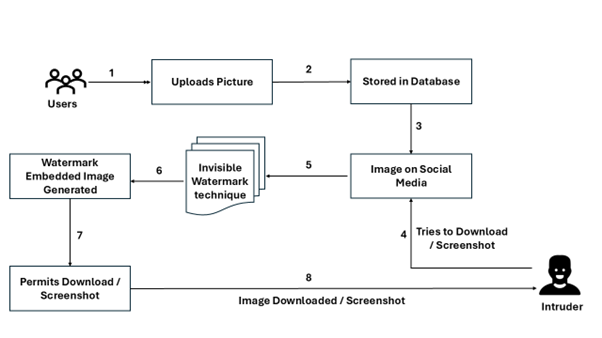Recent News
- Proteome and Phosphoproteome Turnover Atlas in Mice – Paper Published In Cell Journal with 45.5 IF April 1, 2025

Dr Abhijit Dasgupta, Assistant Professor from the Department of Computer Science and Engineering, has published his breakthrough research article titled “Turnover Atlas of Proteome and Phosphoproteome Across Mouse Tissues and Brain Regions” in the nature index journal Cell having an impact factor of 45.5.
Abstract
This study presents a comprehensive in vivo atlas of protein and phosphoprotein turnover across 16 mouse tissues and brain regions, integrating advanced mass spectrometry with stable isotope labeling. By mapping over 11,000 proteins and 40,000 phosphosites, the study reveals tissue-specific patterns of protein lifetimes, correlating them with abundance, function, and protein-protein interactions (PPI). It highlights how phosphorylation regulates protein stability and how turnover is linked to peroxisome function, ubiquitination, and neurodegeneration-associated proteins such as Tau and α-synuclein. This high-resolution resource enhances our understanding of proteostasis and dynamic protein regulation, providing new insights into tissue-specific physiology and disease mechanisms.
Explanation of the Research in Layperson’s Terms
All cells in the body continuously make and break down proteins. The balance of these processes—called protein turnover—is vital for keeping tissues healthy. But until now, scientists didn’t have a clear, detailed map of how protein turnover works across different tissues and brain regions.
In this study, researchers used advanced techniques to measure how long thousands of proteins and their phosphorylated (chemically modified) versions last in 16 parts of the mouse body. They discovered that some proteins, especially in the brain and heart, live much longer than others. They also found that proteins interacting with each other often have similar lifespans, and that specific chemical modifications like phosphorylation can either stabilize or destabilize key proteins—such as those involved in Alzheimer’s and Parkinson’s diseases.
The team created an online tool that lets other scientists explore this rich dataset. The findings can help understand tissue function better and may lead to new ways to treat diseases by targeting protein stability.
Practical Implementation/ Social Implications of the Research
Practical Implementation:
This turnover atlas provides a foundational resource for drug development and tissue-specific disease research. It supports AI-driven approaches to predict protein dynamics, aids in identifying long-lived disease-related proteins, like Tau and α-synuclein, and enhances biomarker discovery for neurodegenerative and metabolic diseases. The integrated tool Tissue-PPT allows researchers to explore and analyze protein lifespan and phosphorylation patterns across tissues.
Social Implications:
Understanding how proteins behave differently across tissues could help create more precise therapies for complex diseases such as Alzheimer’s, Parkinson’s, and cardiomyopathies. The dataset empowers researchers globally to explore protein turnover without relying heavily on animal experiments, advancing ethical and efficient biomedical research.
Collaborations
- Yale University School of Medicine, CT, USA
- St. Jude Children’s Research Hospital, TN, USA
- University Medical Center Göttingen, Germany
- University of Trieste, Italy
- West China Hospital, Sichuan University, China
Future Research Plans
The next phase will focus on AI-driven modeling of site-specific phosphorylation turnover in relation to disease phenotypes, using the Tissue-PPT dataset as a foundation. This includes integrating proteomics, phosphoproteomics, and transcriptomic data to refine our understanding of proteome regulation. Special attention will be given to how phosphorylation modulates the stability of neurodegenerative disease proteins and the development of targeted dephosphorylation therapeutics (e.g., PhosTACs).
This research aims to inform personalised interventions and identify novel therapeutic targets by understanding how tissue-specific protein lifespans are regulated under physiological and pathological conditions.
Continue reading →
- Patent on Invisible Watermarking In Social Media Images March 26, 2025
 Professors, Dr Manikandan V M and Mr Shaik Johny Basha from the Department of Computer Science and Engineering along with their B.Tech. students Ms Aafrin Mohammad and Ms Rohini Sai Pasupula have published the patent titled, “A System And A Method For Adaptive Invisible Watermarking In Social Media Images.” Their patent introduces a novel method for securing photo downloads, ensuring that any unauthorised use of the images can be traced back to its original source if tampered with.
Professors, Dr Manikandan V M and Mr Shaik Johny Basha from the Department of Computer Science and Engineering along with their B.Tech. students Ms Aafrin Mohammad and Ms Rohini Sai Pasupula have published the patent titled, “A System And A Method For Adaptive Invisible Watermarking In Social Media Images.” Their patent introduces a novel method for securing photo downloads, ensuring that any unauthorised use of the images can be traced back to its original source if tampered with.Abstract:
The invention presents a System and Method for Adaptive Invisible Watermarking in Social Media Images to enhance digital privacy and copyright protection. The proposed system integrates advanced invisible watermarking technology to embed unique, imperceptible metadata into images. When users attempt to download or screenshot images from social media, the system automatically adds a hidden watermark containing identifying details such as IP address, Date, Time, and Location. This ensures that any unauthorized use of the images can be traced back to the source. By combining image processing, data encryption, and digital rights management, this system provides a robust solution for protecting online images without affecting their visible quality.
Explanation in Layperson’s Terms:
In today’s digital world, people frequently share personal photos on social media, but there is very little protection against unauthorized downloads or screenshots. Once an image is copied, there is no way to track who took it or where it is being used. Through their invention, the team solves this problem by embedding a hidden watermark in images without changing how they look. This hidden watermark automatically adds invisible information such as the IP address, location, date, and time of the user who downloads or screenshots the image. This means that if the image is misused or shared without permission, it can be traced back to the source. By combining image editing techniques, encryption, and digital security, they ensure that people’s photos remain safe and trackable online. Hence, the invention provides a new way to protect privacy and copyright while allowing users to engage freely on social media.
Practical and Social Implications:
The proposed Adaptive Invisible Watermarking System can be practically implemented using a combination of image processing algorithms, digital watermarking techniques, and cloud-based metadata storage. Below are the key steps in its real-world application:
- Integration with Social Media Platforms: The system can be embedded in social media platforms like Facebook, Instagram, X, and LinkedIn to automatically apply invisible watermarks containing metadata (IP address, timestamp, location, etc.) to uploaded images without altering their visual appearance.
- Automatic Watermarking During Downloads or Screenshots: When a user downloads or screenshots an image, the system automatically applies a second layer of invisible watermarking that includes identifying information of the downloader, ensuring every image copy has a unique identifier for traceability.
- Forensic Tracking and Copyright Protection: If an unauthorized user shares or misuses an image, the embedded watermark can be extracted using forensic tools to trace back to the original downloader, aiding in copyright enforcement, digital rights management (DRM), and legal actions against unauthorized distribution.
- Security and Privacy Features: The system can implement blockchain technology to securely log watermark data, ensuring tamper-proof verification, and provides users the option to control watermarking settings based on their privacy preferences.
- Prevention of Image Misuse and Cybercrime: The system reduces cases of identity theft, deepfake creation, and revenge porn by enabling traceability of unauthorized image usage, helping protect individuals from stalking and cyber harassment.
- Enhanced Digital Privacy and Ownership Rights: Users are empowered to maintain ownership of their photos even after sharing them on social media, encouraging ethical content sharing while discouraging unauthorized downloads.
- Impact on Content Creators and Businesses: Artists, photographers, and digital content creators can protect their work from theft or unauthorized republishing, while influencers and businesses can safeguard their brand assets and prevent content duplication.
- Legal and Ethical Implications: The system encourages social media companies to take responsibility for user content protection and supports law enforcement in tracking down offenders involved in image-based cybercrimes.
Future Research Plans:
- AI-Powered Watermarking and Deep Learning for Image Security
- Blockchain-Based Digital Rights Management (DRM) for Image Ownership
- Cross-Platform Compatibility & Social Media API Integration
Link to publication: https://search.ipindia.gov.in/IPOJournal/Journal/Patent
Continue reading →

